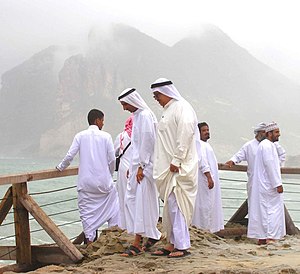Thawb
Thawb or thobe (Arabic: ثَوْب lit. 'dress' or 'garment') is an Arab dress for the inhabitants of the Arabian Peninsula, also called dishdashah, and kandurah, kandoora or gandurah in varieties of Arabic.
A long-sleeved ankle-length traditional robe, it is mainly worn by men in the Arabian Peninsula, Jordan, Syria, Palestine, Lebanon, North Africa, and some countries in East and West Africa, with regional variations in name and style. It is also worn by Muslim men in the Indian subcontinent due to its modest appearance, and is referred to as jubbah. Depending on local traditions, a thawb can be worn in formal or informal settings; in the Gulf states thobes are the main formal attire for men. The term "thobe" is also used in some varieties of Arabic to refer to women's attire, such as in Palestine and Sudan.
| Type | Robe |
|---|---|
| Material | Polyester fabric, wool or cotton |
| Place of origin | Arabian Peninsula |
Jellabiyas, a traditional garment mainly worn in Egypt and Sudan differ from thawbs, as jellabiyas have a wider cut, no collar (in some cases, no buttons) and longer, wider sleeves.

Etymology
The word thawb (ثَوْب) is a Standard Arabic word for "dress" or "garment". It is also romanized as thobe or thaub or thob.
Name variations


| Region/country | Language | Main |
|---|---|---|
| Saudi Arabia, Yemen, Bahrain, Qatar, Palestine | Hejazi Arabic, Yemeni Arabic, Najdi Arabic, Bahraini Arabic, Palestinian Arabic | Thawb/Thōb (ثوب) |
| Levant, Iraq, Kuwait, Oman, Khuzestan | Levantine Arabic, Mesopotamian Arabic, Omani Arabic, Kuwaiti Arabic, Ahvazi Arabic | Dishdāshah (دِشْدَاشَة) |
| United Arab Emirates, Morocco, Algeria, Tunisia, Libya | Emirati Arabic, Moroccan Arabic, Algerian Arabic, Tunisian Arabic, Libyan Arabic | Kandūrah (كَنْدُورَة)/ Gandūrah (قَنْدُورَة) |
| Central, South and Southeast Asia | Bengali, Malay, Persian, Urdu | Jubbah/Jobbeh (جُبَّه), Jubah (جُبَه) |
Regional differences
The thawb is commonly worn by men in the Arabian Peninsula. It is normally made with polyester fabric, but heavier materials such as sheep's wool can also be used, especially in colder climates in the Levant. The style of the thawb varies between regions. In Iraq, Kuwait, the Levant, and Oman, dishdashah is the most common word for the garment; in the United Arab Emirates and the Maghreb, the word kandura is used.
Gulf countries
In the Gulf states thobes are typically made with white or beige polymer fabric, with coloured wool thobes worn in the winter months. Thobes commonly worn by men and are considered as symbols of national and cultural identity, and are appropriate attire for formal occasions and religious ceremonies. In recent years, the thobes have become a popular fashion item, with many fashion designers adding their own modern twists to the traditional garment.
In some Gulf countries, thawb sleeves and collars can be stiffened to give a more formal appearance, front pockets and embroidery could be added and placket buttons can be covered, exposed, or replaced by zippers. In the UAE and Oman, men's thobes have no collar, use frog closures as placket fasteners, and include tassels; in Oman, tassels tend to be short, and in the UAE tassels extend to waist.
Sudan

In Sudan, the term tobe is used to refer to women's outer garments. In her book Khartoum at night: Fashion and body politics in imperial Sudan, cultural historian Marie Grace Brown explained: "Meaning “bolt of cloth,” a tobe is a rectangular length of fabric, generally two meters wide and four to seven meters long. It is worn as an outer wrapper whenever women are outside their homes or in the company of unrelated males. The tobe's origins date back to the late eighteenth century when prosperous merchants in Darfur clothed their wives and daughters in large swaths of fine imported linen, muslin, and silk as a sign of their wealth and prestige." In the context of urban culture in Sudan since the 1930s, new and often colourful styles of tobes became fashionable, as Sudanese women "expressed their growing opportunities and desires through fashion."
Palestine
The traditional Palestinian woman's long tunic is also called thawb. It is richly embroidered, with different colours and patterns signifying various aspects of the wearer's social position and it's unique from town or city to another.
Other occasions
A thawb is sometimes worn with a bisht (بِشْت), also known in other parts of the Arabian Peninsula as a mishlah (مِشْلَح) or ʿabāʾ (عَبَاء), meaning 'cloak'. It is usually worn on ceremonial occasions or by officials. A bisht is usually worn by religious clergy, but can also be worn at weddings, Eids and funerals. It may indicate wealth and royalty or sometimes a religious position. It was originally manufactured in Syria, Iraq and Jordan, and it is usually worn in the Arabian peninsula, Jordan, Syria and parts of southern Iraq.
According to H. R. P. Dickson, Bedouin women would mount a brightly coloured thawb on a pole in front of a tent in order to welcome home a traveller or an important person coming to visit.
Rashida Tlaib, a Democratic member of the United States House of Representatives from Michigan and the first Palestinian-American woman elected to that body, wore a thawb to her swearing-in ceremony on January 3, 2019. This inspired a number of Palestinian and Palestinian-American women to share pictures on social media with the hashtag #TweetYourThobe. Like the ghutra, thawbs were also popular during the 2022 FIFA World Cup in Qatar.
See also
References
This article uses material from the Wikipedia English article Thawb, which is released under the Creative Commons Attribution-ShareAlike 3.0 license ("CC BY-SA 3.0"); additional terms may apply (view authors). Content is available under CC BY-SA 4.0 unless otherwise noted. Images, videos and audio are available under their respective licenses.
®Wikipedia is a registered trademark of the Wiki Foundation, Inc. Wiki English (DUHOCTRUNGQUOC.VN) is an independent company and has no affiliation with Wiki Foundation.
